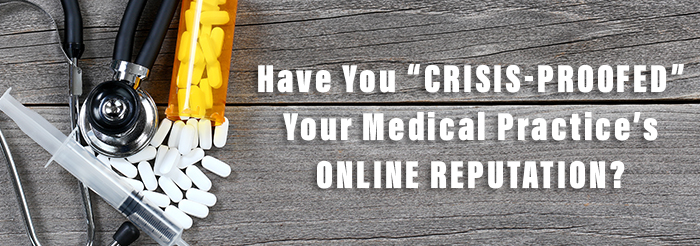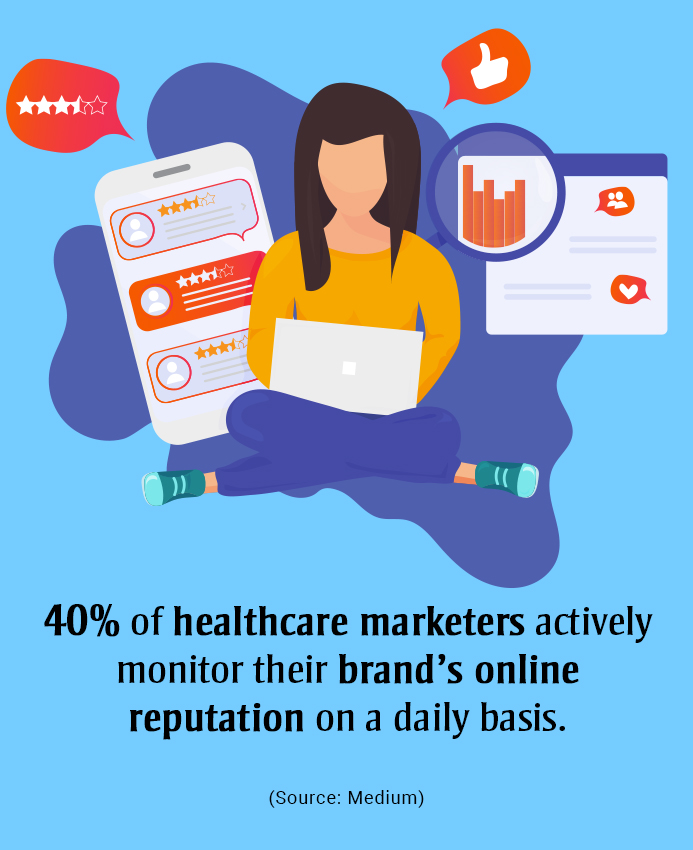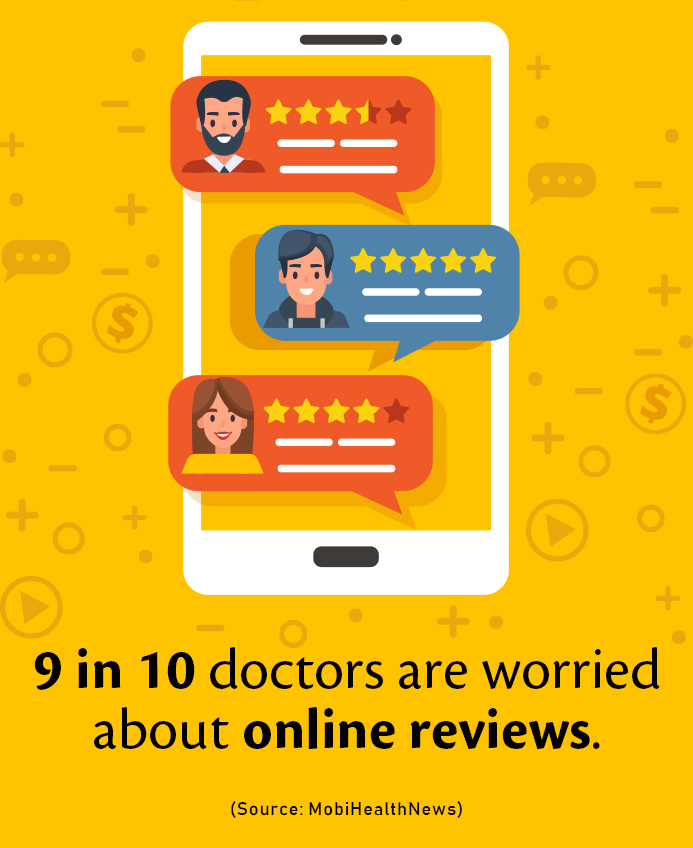Have You “Crisis-Proofed” Your Medical Practice’s Online Reputation?
Posted on
If you are one of the many healthcare marketers who believe in the adage, “There’s no such thing as a bad reputation,” we’d suggest you think about it again. This age-old saying has become one of the biggest myths in the online reputation management world today.
Regardless of the size of your medical practice, an online reputation crisis can happen at any moment. Many medical practices or healthcare marketers fail to prepare and are often overwhelmed when “the negative publicity hits the fan.”
Trust us when we say that prevention is better than cure, and also trust us when we tell you about the devastating impact of online reputation damage to medical practices. It pays to be prepared.
Let’s be honest: There’s more to online reputation management than sending out apologies or deleting unfavorable online reviews. While it’s nearly impossible for anyone to predict every possible online reputation crisis for every potential situation, it’s very much possible (and is also good practice) to plan for the unexpected.

What Is an Online Reputation Crisis?
An online reputation crisis is an event or series of events that threatens a medical practice’s brand image. It can slow down growth, disrupt business operations and negatively impact your bottom line.

You might want to think that all of your patients are satisfied with your services, and something of this sort will never happen to you. But our experience of more than two decades says it could, and probably will, at some point. And if it does, according to data, you might risk losing 22% of business when potential patients find just one negative online comment about your services. This number will rise to a whopping 70 percent with four or more negative reviews.
How Can Brand Reputation Crisis Affect Your Medical Practice?
There are different types of online reputation crises, from patient dissatisfaction to bad reviews leading to a social media crisis. Each of these can affect your medical practice in different ways, such as:

1. Damage to brand image: Damaging stories and negative comments can appear in search engine results and impact your ranking as well as brand perception. Negative search engine results will hit that positive brand image you have spent years building.
2. Loss of revenue: Adverse changes to your online reputation will impact your bottom line. If your positive page-one search results drop down in the search results, your website traffic will suffer drastically.
What Is Business Reputation Crisis Management?
Broadly, there are two types of crisis management plans: reactive and proactive. The reactive plan takes a “firefighting” approach, waiting for a crisis to happen and then dealing with it. Whereas the proactive plan is making sure that your medical practice is equipped to handle and overcome any potential issues.
As a healthcare marketer, you might be tempted to put off planning your crisis management when things are going well. However, do not forget that unprepared medical practices are more likely to make poor decisions when a crisis occurs. These poor decisions may have long-term effects. For example, your medical practice brand could be seen in a negative light if you are quick to respond to negative comments without knowing all the facts.

And this is the reason it pays to be smart.
The three common online reputation management stages are before the crisis, during the crisis and after the crisis.
How to Prepare for a Brand Reputation Crisis Before it Happens
Before a crisis arises, it is wise to put a plan in place. Take the time to identify and train the key resources and draft your crisis management plan. This should form a part of your online reputation management strategy so that you can take back control.


1. Bring together an online reputation crisis management team.
Ideally, the owner of the medical practice should lead this, with senior executives and healthcare marketers. Remember to include senior members from all other departments, such as patient service, front desk, etc. (and location if you operate across different states). It will help you assess any potential vulnerabilities.
2. Identify your weak points and address them directly.
Have your crisis management team identify any potential weak points and create a list of anything that harms your reputation. By doing this, you will identify and address potential problems before they become a crisis.
3. Draft a crisis management plan.
It would help to draft a crisis management plan as part of your company’s online reputation strategy and business and marketing strategy. Make sure it is customized to your medical practice. It should address the following:
- Stakeholders.
- Identify the spokesperson for each communication channel, such as social media networks.
- The hierarchy for decision-making.
- Emergency action plans.
- Preparing drafts that can be used for the media/patients.
4. Monitor your healthcare brand and set up online alerts.
Online brand monitoring will help you identify and address any negatives on social media and third-party review sites. For instance, you can use Google Alerts for keeping up-to-date with online mentions. You can consider using Google Alerts in conjunction with other online reputation management tools. However, do not just monitor your brand’s online presence. You must monitor mentions for your key doctors, too, as their personal reputation crisis may have an impact on your medical practice.

How to Safeguard Your Online Reputation During a Crisis
Activate your online reputation crisis management plan with your healthcare digital marketing agency. Try to keep all stakeholders, including employees, informed throughout the process, and maintain regular contact. Clear communication will help you regain the trust that your patients, stakeholders and employees have in your brand’s reputation.
Ways to Recover From a Business Reputation Crisis
When you are in the thick of a crisis, it’s challenging to think about other aspects of running a medical practice. However, there is always the recovery period, and it is best to think about using online reputation management strategies to minimize and repair the damage. If your search results are negative, which doesn’t show your medical practice in a positive light, these strategies will help you strengthen your online reputation.
Conclusion
Remember the Benjamin Franklin quote, “By failing to prepare, you are preparing to fail.” When you are managing your online reputation and crisis strikes, your first instinct will be to fall back on a framework. Just keep calm, know the facts, provide a clear message, monitor online conversations, be transparent and spread the positive word across all relevant channels. And last but not the least, learn from your “wins” as well as your “losses.” You are going to have to look back and answer whether you were busy fanning the flames or you actually put the fire out.

 Why Good communication Matters in Healthcare
Why Good communication Matters in Healthcare De-Escalation Tips for Handling Aggressive Patient..
De-Escalation Tips for Handling Aggressive Patient.. Reaching The Right Audience Through Target Marketi..
Reaching The Right Audience Through Target Marketi..